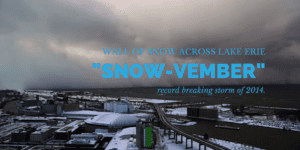3 Winter Weather Conditions That May Render An Alarm System Virtually Ineffective
 The “Snow-vember” Storm Of 2014 Blanketed Thousands Of WNY Homes With Record Breaking Snowfall
The “Snow-vember” Storm Of 2014 Blanketed Thousands Of WNY Homes With Record Breaking Snowfall
As Western New Yorkers, we’re no strangers to extreme weather. Whether it be lake-effect snowfall, strong winds or heavy rain, we have experienced it all. Alarm systems, primarily designed to protect structures, also offer the additional benefit of detecting of Mother Nature’s blows (flooding, heat, cold). However, in order for them to work properly during extreme weather conditions, homeowners need to be aware of a few conditions that can affect how alarms systems operate, communicate and offer protection.
1. Power Outages
Inevitably, power outages will accompany extreme weather conditions such as a winter storm. Unfortunately, some burglars see power outages as an opportunity to commit their crimes undetected, under the cover of darkness or amidst confusion while their victims are distracted. To remain one step ahead of these opportunists, homeowners should have a basic understanding of how alarm systems use power to operate in order to keep their homes safe in a storm situation:
Understanding a Security System’s Main Power Source: All security systems need a source of electricity to power the control panel and thus all of the devices wired into the panel. The main source of power for the alarm control panel is a transformer. A transformer is a device that plugs into a standard 110Volt (house plug) outlet.
Back-Up Power: During a power failure, the transformer will not provide power to the system. It will go into “back-up mode” and resort to the secondary means of the power for the control panel – the back-up battery power supply. This battery supplies power to the control panel in any situation when the transformer fails. This could happen for numerous reasons: power outages, someone unplugs the transformer, the circuit breaker is tripped, or a defective transformer.
Power Restored: As storms subside and power is restored to the house, power is restored to the control panel. The panel itself will then recharge the back-up battery. Under normal conditions, the control panel will check (or test) the back-up battery at least once a day to make sure it will react properly if needed. Normal life expectancy of a security system back-up battery is approximately six years. Learn how to check your system battery here.
An Even Bigger Threat: The lack of power over an extended period will cause an alarm system to shut down. However, a bigger threat happens during a short-term power outage when the system is still operational but can no longer report an emergency due to a lapse in communication with the central station.
2. Lapse In Communication (Telephone Service)
This lapse in (security monitoring) communication occurs when digital telephone services known as VoIP or Voice over internet protocol is used over regular old telephone lines (often referred to as “pots” lines). With or without a storm, it’s critical that people alert their alarm provider that they have made a change to their telephone service.
VoIP telephones, which are digital carry no electrical current and do not have their power supplied through a phone line like traditional telephone lines. VoIP calls transmit signals via the internet that is less reliablethan a telephone line, especially during a storm.
Even with a backup battery, today’s VoIP and fiber optic systems only provide up to approximately eight hours of standby service. Despite the battery backup or even whole house generator, a security system using VoIP communication will not work if there is a large area power outage. Check out this article for more information on VoIP phone lines and security systems.
3. Overwhelmed Emergency Personnel
Since police departments are overwhelmed during disasters such as snow emergencies, it is critical that homeowners proactively take steps to secure their homes during a snow storm.
Expect That Police Department Phone Lines Will Be Busy.
Although alarm companies have designated telephone numbers to dispatch emergency personnel, these lines do not take precedence over 911 emergency telephone lines. In the event that your alarm triggers at the same time as another emergency, your emergency might not be a priority… Be prepared by paying attention to #2:
Update Notification Call Lists.
If your home needs attention during a storm, your security company will know who to call. Add a neighbors phone number to your file. The central station will then have a second line of defense against anything that may need attention on your home front. This doesn’t mean that they should rush over and possibly encounter a criminal. It means that they should observe the activity at your home and report it to the police if needed.
Keep Ducts Clear.
Accumulated snow can block your homes exhaust ducts and create an environmental hazard (a build up of Carbon Monoxide) inside your home. Especially during snowy, windy conditions, make sure that heat and exhaust ducts can breathe so as to avoid triggering an environmental alarm.
While an occasional snow day can offer a welcome escape from reality, too much of Mother Nature’s white and windy curse can wreak havoc and render your home alarm system incapable of protecting its very important assets (you).
Have questions about your security system? Give us a call… We’ll inspect your current system and recommend a solution to keep you protected during the next big winter storm.


